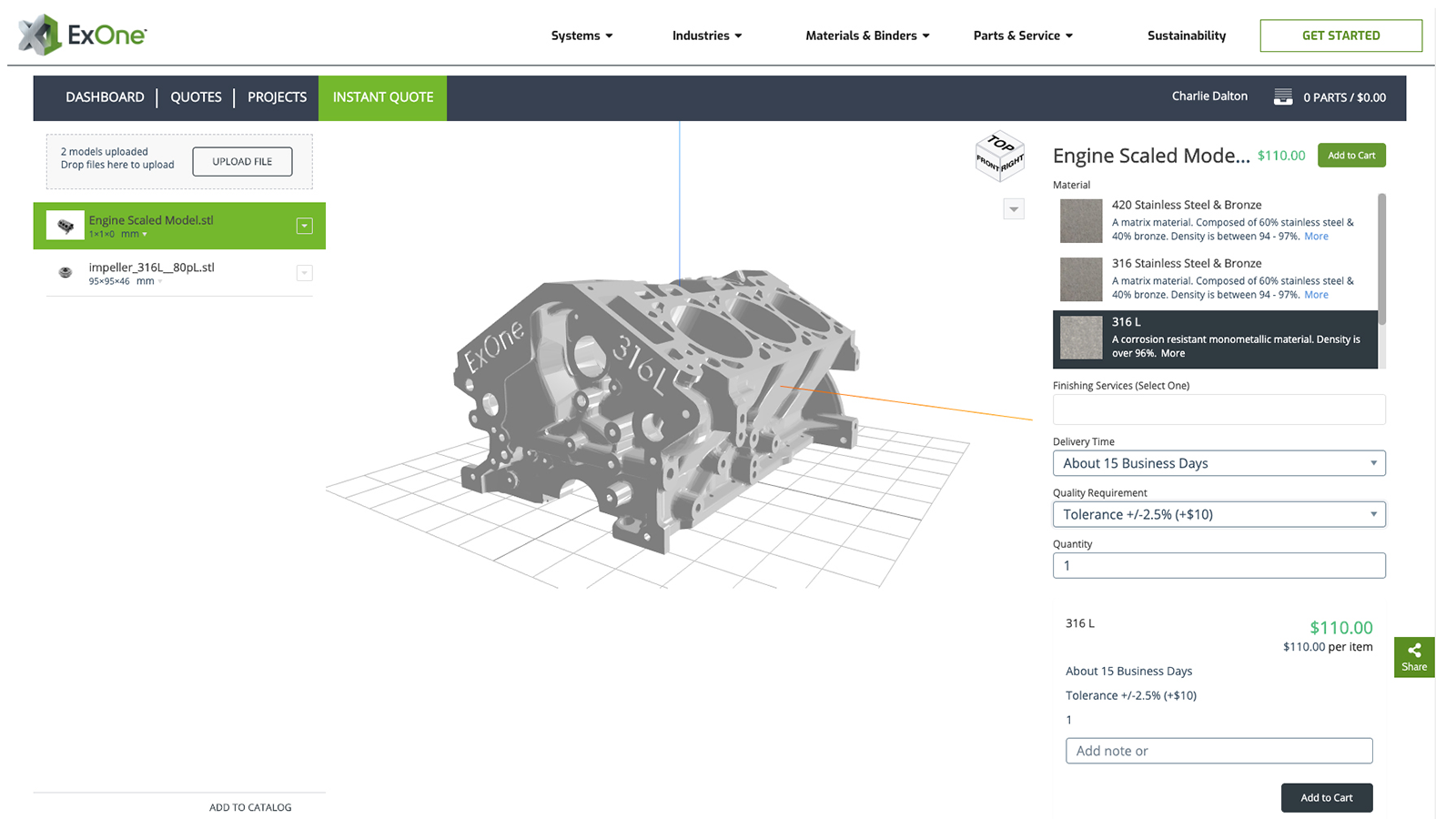Quick Ship Metal 3D Printing Services
Quick Ship Metal 3D Printing Services
Quick Ship parts will be 3D printed at ExOne's metal production facility outside Pittsburgh, which has been binder jetting metal parts for more than two decades. It's home to a fleet of more than two dozen metal 3D printers producing parts for prototype, low-volume, and serial production projects.

The ExOne Company (Nasdaq: XONE), the global leader in industrial sand and metal 3D printers using binder jetting technology, today announced the launch of its updated Quick Ship metal 3D printing services, featuring a new digital quoting tool and materials.
ExOne Quick Ship will now add the popular stainless steels 316L and 17-4PH to the list of materials offered through instant quoting, with delivery times of 10-15 business days, depending on number of units requested, part size, and other requirements.
"After two years of supplying thousands of 316L and 17-4 parts to select industrial customers, our updated Quick Ship services will now allow any customer to easily acquire and evaluate affordable single-alloy parts 3D printed with binder jetting," said John Hartner, ExOne CEO.
The ExOne Quick Ship Dashboard will allow consumers to upload a file for an instant quote for purchase at www.exone.com/quickship.A new Quick Ship online dashboard, available at www.exone.com/quickship, will allow customers to upload a qualifying digital design file for an instant quote and purchase, as well as create an account to track projects. More than 30 file types are accepted including STL and STP files.
Quick Ship parts will be 3D printed at ExOne's metal production facility outside Pittsburgh, which has been binder jetting metal parts for more than two decades. It's home to a fleet of more than two dozen metal 3D printers producing parts for prototype, low-volume, and serial production projects.
Quick Ship Service Represents Critical Progress
Binder jet 3D printing is a method of additive manufacturing in which an industrial printhead deposits a liquid binder onto a thin layer of powdered particles, layer by layer, until an object is formed. Parts printed in metal powders are then sintered in a furnace to fuse the particles.
In development since 1996, ExOne metal binder jet systems are capable of producing parts in more than 20 metals, ceramics and composite materials today. The technology is viewed as a disruptive and sustainable production method, largely because of its high speed, relatively low cost and material flexibility, among other benefits.
"The launch of Quick Ship services for single-alloy metals represents a key step forward in our development of metal binder jetting, and one that signifies our continued confidence in this technology," said Rick Lucas, ExOne Chief Technology Officer and VP of New Markets. "We also have plans to expand the number of material offerings and size of printable parts in our Quick Ship services by year-end."
Featured Quick Ship Metal 3D Printers
Quick Ship parts in 316L and 17-4PH will be 3D printed on ExOne's Innovent+ and X1 25Pro metal 3D printing systems. Both machines feature ExOne's exclusive Triple ACT system, an advanced compaction technology that delivers industry-leading density and repeatability in metal binder jetting. ExOne 3D printers with Triple ACT are capable of delivering sintered dimensional accuracy of +/- 2.5% on a first print run, with better results possible after additional sintering optimization.
ExOne will continue to offer its popular 316 and 420 materials infiltrated with bronze on its classic M-Flex and R2 metal 3D printing models, which have been in operation since 2013 and 2003, respectively. Infiltrated parts, which offer a variety of functionality and finish benefits, are typically shipped within 10 business days.
Other Materials Available Through Premium Quote
Part requests for a material not eligible, or too large, for Quick Ship delivery can be quoted through ExOne's Premium Quote Service at www.exone.com/quickship.Metal, ceramic and composite materials not available through ExOne's Quick Ship service will continue to be offered on a limited basis through ExOne's Premium Quote service. Delivery times will vary based on the project details.
The full list of materials printable on ExOne 3D printing systems can be viewed at www.exone.com/metalmaterials. Materials such as M2 Tool Steel and Inconel 718 are available for quoting, and quote requests may depend on material availability.





